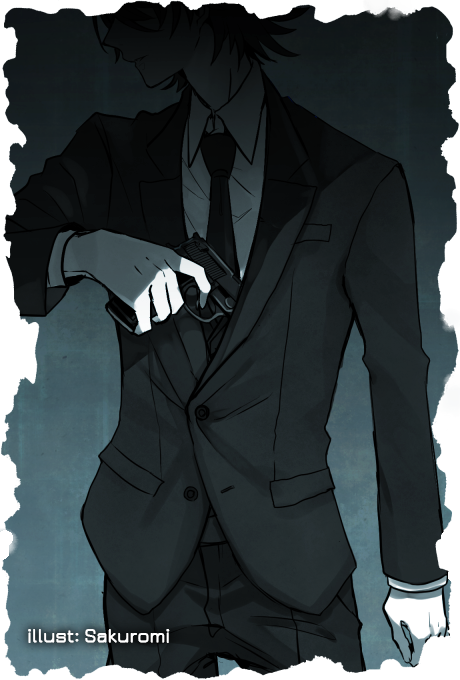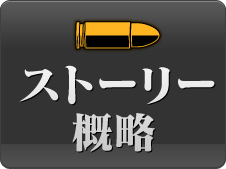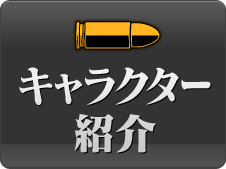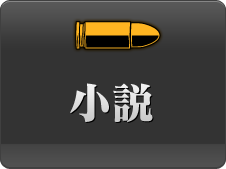#83: WAR
The Tri-Surveillance Network System was originally proposed in the year 2000 by a Canadian scientist under the employ of the federal government. The idea was simple: employ three separate advanced AIs all specializing in different fields to effectively and efficiently manage confidential information. The theory in itself was not put to the test until some time into 2010 by a division of the Royal Canadian Military known as the Canadian Transmission Bureau which operated primarily as a front for testing experimental technologies like the TSN System and beyond.
The CTB was created in part by a fledgling officer undeserving of such an immense promotion, and was considered an unprecedented move in the military's history. The Canadian Navy to this day features cannons as one of its primary forms of defense, yet a conspicuous amount of taxpayer money was funnelled into the CTB's formation under the command of someone who could still be considered “green,” almost as if the entire project was the plaything of someone higher up on the political ladder.
Nonetheless, the CTB set the foundations for modern cybersecurity as we know it. The staff of the CTB in its original form was then absorbed into the World Network Council and restructured by then US president Alex Coleman into the modern day Network Analysis Bureau. The CTB continues to operate, but, as previously mentioned, is now a playground for scientists.
The resurrection of the TSN System happened here. While technology was nowhere near the estimated requirements in 2000, huge strides had occurred in the ten years between 2000 and 2010, and the TSN System suddenly sprang to life in the laboratories of the CTB.
It was a resounding success.
The AIs routed any malicious activities in all simulations, even stopping one legitimate attempt of cyber espionage by an unknown hacker in 2011. When the CTB presented its findings at the annual WNC spring meeting of 2012, the entire world's eyes focused on this small underground facility in southern Canada.
Countries began to send their greatest minds underground, as a race began to be the first to move the project out of beta. In 2014, it happened: a Japanese programmer by the name of Jun Bansyoya successfully created a workable version of the TSN System for private use. The CyberConnect Corporation immediately made an offer and hired Bansyoya to continue development privately. By 2017, the TSN System had become common use in all private corporations around the world.
2023: ALTIMIT, the parent company of CyberConnect, in part with the American NSA, proposes the TSN Protocol at the UN cybersecurity summit. Emir Savas, an employee of the NSA, derails the summit by exposing a backdoor into the system from which ALTIMIT or the NSA would be able to manually alter the AIs' findings, reportedly yelling, "Evil surrounds us all, and it will drag us all to Hell!" before being escorted from the summit.
The NSA denies all allegations. It is discovered that Savas is not even an employee of the NSA, but the credibility of this statement remains unknown. Quietly but surely, the man named Emir Savas disappeared off the face of the earth. Records show he last flew to Turkey sometime after the incident, and then disappeared into the fold.
ALTIMIT holds that it will implement the TSN System by the end of the year 2026. Riots break out at NAB branches all over the world. In Tokyo's Ginza district, activists stage an occupation demonstration for 24 hours, blocking all roads. Industry stops, but no one at the top sweats. The world will go on like normal, the stock market will open, and pockets will get deeper. Emir Savas is just one more casualty in the line of heroes who took up arms.
I am not quite sure what to make of any of this. There is obviously something sinister happening here, but it seems to be between all parties. Which part of the story is the smokescreen, and what truths are they designed to obscure?
I took matters into my own hands sometime into 2023, and decided I would seek out Emir.
When I arrived in Turkey, I had a single lead: that there had been a bar fight in a smaller municipality called Akhisar in the west where someone matching Emir Savas' description had been seen. I was given this tip off by an FBI informant of mine, as their investigation into Mr. Savas is still ongoing.
I boarded a bus immediately upon leaving the airport. I had no translator with me, and all I could do was point to my map and hope for the best. I rode for what felt like days. The mountain ranges of Turkey are vast and undeveloped, with tunnels only stretching through the ones that block the paths of business and agriculture. Out west, towards Akhisar, the mountains had paved roads leading around and around their edges, but not through. It's an uncomfortable experience. I feel like vomiting. The smell of the bus indicates it hasn't been cleaned at least since I was born. The bus drives round and round, the edge of the mountain road playing a dangerous game with the long bus. An old lady who joined the journey at the foot of the mountain asks me for a cigarette, and I oblige. She asks me where I'm going, and I tell her Akhisar.
"That'll be a shock. They've probably never seen people like you over there," said the old lady. I guessed Akhisar wasn't the type of place to see Indians often. She spoke in perfect English.
Surprised, I told her, "Your English is very good!"
To which she responded, "Of course it is. Why wouldn't it be?"
There were many reasons why, but I didn't ask any further.
She smoked one cigarette, two cigarettes, and then a third, all the while telling me about how Akhisar was known for its tobacco production. "Too bad that crap can't measure up to even the most garbage of American cigarettes," and then she leaned in for a light.
When we got to Akhisar it was nighttime, and I asked if she knew the pub that the man who looked like Emir had appeared in. She points me towards a place called Bira Cenneti, or "Beer Heaven" in English. Before we part ways I show her the photograph of Emir I have on my cell phone. "Do you know this man?" I ask.
"Of course I do. That's a photograph of every man in Turkey," she said, and then disappeared into the night.
I showed up at the pearly gates of Beer Heaven half past midnight. It was a dreary kind of place, traditional Turkish music playing that evokes a sadness that doesn't belong to modern listeners. There's no real sound to it--it just fills the air, like a performance for no one in particular. The bartender looks at me funny, which he has every right to.
He says something to me in Turkish. I tell him I can't speak the language, but we make it work over the translation app developed by the folks at our very own ALTIMIT, an AI-enhanced thing that is a solid attempt at naturalizing machine translation. I can't tell if it's working, but at least my ideas are getting across. I show him the photograph of Emir. He makes a face, and types into the phone that the man in the photograph is not welcome there anymore. I try to implore why, but CyberConnect's magic app fails, and we enter into a jumble of ideas.
At precisely that moment the old lady walked in the doors.
"Thought I'd find you here," she said.
The old lady orders raki, the country’s drink of choice. She drinks it straight, no ice. The old lady has a short conversation with the bartender, while he gestures vaguely in my direction.
"Can you ask him what happened to this man?"
"I already have," she said.
There was a pause.
"Will you tell me what he said?"
"If you cover my tab tonight."
I agree. She orders another round, and the bartender plops down a raki in front of me too. It tastes like black licorice.
She explains to me that the man in the photograph had come here and had an argument with a suited Asian man. She made a note that it was the first time anyone in the town had seen him, or even someone from the region in general. Akhisar was not a place foreigners visited for tourism, she said. The man in the photograph had floated into town a month ago, and the suited man had never been seen before. They apparently spoke for a while in English, and the man in the photograph continued to become angrier and angrier. He swung at the Asian man, and in response he revealed a concealed weapon as a threat.  At that the bartender tried to tell him that fist fights were OK, but weapons of any sort were no good. He was a man of honour, he said, and men of honour solve things with their fists. So it goes.
At that the bartender tried to tell him that fist fights were OK, but weapons of any sort were no good. He was a man of honour, he said, and men of honour solve things with their fists. So it goes.
The suit respected the bartender's moral code. They had a textbook bar fight, but the Asian man was clearly trained in some form of self defence, whereas Emir was a code monkey out of the jungle. Their altercation had been short, and turned violent quick. Eventually paramedics were called, and they took Emir to the local hospital. Then, as records show, he was transferred to the police, who took the mugshot on my cell phone. He had been charged with petty property damage, and was released practically overnight. No one had seen him since.
"One more thing," said the old lady. "That Asian man--he says he looked real young. Like a kid."
"Like a kid?"
"Well, he was definitely a full grown man. But there was a youthfulness to him." I looked at the bartender, and he said something in Turkish. The old lady translated: "Like someone pretending to be an adult."
It was time to go to the police station. Emir Savas had been here, that was for sure, but nobody had seen him for at least a week. As I got up to leave, the old lady grabbed my arm.
"You still haven't paid my tab."
"I can leave some cash," I said.
"You'll be damned before you do that. You're gonna sit here and drink."
And we did. I'm not too into drinking--it gets messy fast, and for someone in my profession I know a bit too much to allow loose lips. You know how it is.
I don't really remember what happened after that. I wasn't used to raki, and didn't realize how fast it hits you in small quantities. The Turks are efficient.
When I woke up, it was morning, and I was lying face up on the road outside Beer Heaven. The gates were closed, and I was barred from entry.
I gave myself a quick pat. Cell phone was gone, obviously. And with that, so was my photograph of Emir Savas. I wandered over to the police station. Of course, the old lady was gone, so translation was impossible. I couldn't show the photograph either, and the cops just stared at me. One of them kept saying in English, "How may I help?" with long pauses between each word. No matter how many times I tried to explain how he could help, he just kept repeating "How may I help?"
Frustrated, I left. I ventured past a group of old men sitting around a table eating watermelon and smoking. They smile and call me over. I, with nothing better to do, decide to pass the time with these old men. They ask me questions I don't understand. This is the common theme of my trip, it seems. I wish I brought a translator, but my FBI informant told me this had to be a "covert op." If it was so damn covert why didn't she do it herself?
The old men offered me some watermelon. It was the most delicious watermelon I'd ever had in my life.
Then one of the old men's faces lit up, and he said something to the others. He looked at me and said what I can only assume is "wait" in Turkish, and then reached into his jacket pocket to pull out an ALGOS brand smart phone. He showed me the same translation app I had used. He types something in and out comes "Hello, how are you?" in a woman's voice. The three old men make a noise in amazement and eagerly await my response. I tell them my phone has been stolen. They make another noise of pity. Then I remembered.
The photograph of Emir was tied to my chat account. If I could access the account, then I would be able to secure the photograph. I quickly explain and embellish the story with some grandiosity to ascertain my chances of using the cellphone. I lie and tell them I'm an FBI agent, but really, any acronym would've convinced them. They all look at me with awe, a million American spy films flashing before their eyes at once, and hand me the cellphone.
I log in and secure the photo, and then realize I can't take the phone with me to the police. It doesn't matter, because the man across the table points in surprise. I hand him the cell phone.
"I know him," says the automated female voice. I ask for him to continue. "That's Erbil's son."
"Where can I find Erbil?" I ask him.
"Not possible," the voice says.
"Why?"
"Missing. Since last week."
After finding a payphone I called the secure line I was given by my FBI informant.
"Good afternoon," she said. It was afternoon for her, but nighttime for me.
"I can't find him," I told her.
"Emir?"
"Yeah. His dad's missing, and when I checked out his place, there was no one there. According to locals he was in poor health, and his son hadn't been home for many years. He was working hard overseas to send money back home--a usual story for those who don't want to work in tobacco."
"I see."
"There was also something about an Asian man."
"An Asian man? Do you know where in Asia specifically he was from?"
"You think these people could point out Korea on a map?"
"I guess not."
"Anyway, that Asian guy is why he was arrested."
There was silence for a bit.
"You still there?"
"Yes. Listen, Vincent, good work. I'll pay double the usual rate."
"That's code for 'shut up and don't talk,' yeah?"
"You got it."
"Fine by me. I got a free vacation out of this. Got my phone stolen and everything."
"Your phone was stolen?"
"Yeah, no idea where it's gone."
"That thing is pretty sensitive..."
"It's probably been pawned off to some kid by now. I doubt it'll fall into the wrong hands."
"I hope not..." she trailed off. I was dubious of her tone, but I didn’t pry any further. Too hungry to bother.
"I don't have any money on me either. Can you wire me some of my stuff in advance?"
"What cryptocurrency do you prefer?"
"Can't do crypto. Phone's gone, did you forget?"
"Right... I can't really send you cash."
"What?"
"That kind of thing leaves a really obvious trail."
"So, what, then?"
"Look, I'll try and get you some help as soon as I can, I've just got a bit of a situation here. Coworker of mine has gone completely postal."
"Listen, workplace drama is the least of my worries right now. I can't speak a word of Turkish and I'm starting to get the munchies. How do I order a burger around here?"
"I'll see what I can do, but I'm really too busy for this right now."
"Look, you better--" and then the line cut.
And now I am here in the sand. It's hot and I thought I'd write this to take my mind off the hunger. I'm still waiting for the contact.



